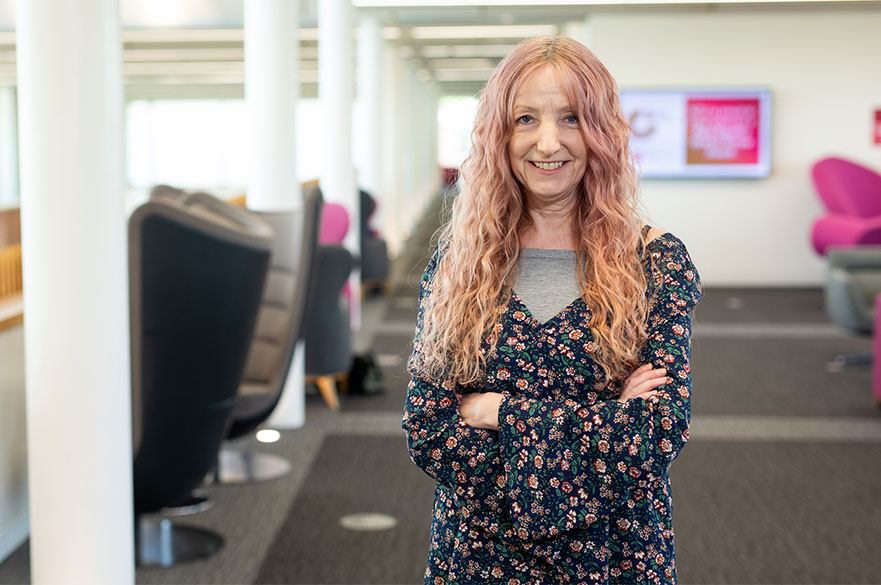Role
Lecturer/Senior Lecturer Molecular Biosciences.
Dr Coutts is module leader for Cell Culture and Antibody Technology (MSc flexi), Molecular Biology and Protein Structure (UG) and teaches across a number of UG and PG modules including Living Systems, Molecular Biology and Protein Structure, Cancer and Heart Disease, Cell Signalling and Cancer, and Cell Culture and Antibody Technology (FT).
Her research activities involve tumour cell survival and motility and understanding the links between transcriptional regulation and cell survival during the stress response.
Career overview
After obtaining a PhD in Molecular Biology and Biochemistry, Dr Coutts undertook postdoctoral studies at the Beatson Institute for Cancer Research (1999-2004), the University of Glasgow (2004-2005), and the University of Oxford (2005-2016), before joining Nottingham Trent University in August 2016.
Research areas
Tumour growth is achieved by overriding cell cycle control and bypassing cell death. Mechanisms influencing cell survival such as apoptosis and autophagy are key determinants of cell fate during stress. Moreover, during tumour progression the acquisition of metastatic potential is the most devastating event in human cancer with metastatic disease the cause of 90% of cancer deaths. Importantly, understanding how the cell integrates a variety of signals to affect a cellular outcome is clinically relevant and a poorly understood process.
Dr Coutt’s work involving the p53 co-factor JMY has uncovered novel links between cell motility and the DNA damage response as well as mechanisms involved in autophagy and cell survival. Her research seeks to explore how a transcription co-factor links the cytoskeleton with nuclear events during the stress response, how this impacts on p53 activity and cell survival, and the role of actin in these processes.
Research degrees at NTU | Nottingham Trent University
At Nottingham Trent University, we're creating future innovators and impact for education, industry, the professions and society. We offer opportunities for MPhil, PhD and Professional Doctorates and a researcher support programme that prioritises your professional development. Further information may be obtained from the NTU Doctoral School.
Thematic areas for prospective PhD projects:
- Understanding the regulation of the p53-cofactor JMY in human cancer
- Links between autophagy and cancer cell migration
- Regulation of p53 activity by JMY
- Cell cycle regulation and cancer
- Understanding the role of nuclear actin in gene expression
External activity
Public engagement: Member of British Science Association and Chair of the Oxford Branch British Science Association (2009-2016).
Editorial:
Associate Editor, Bioscience Reports (2018-present)
Language Editor: Oxford Language Editing, Oxford University Press (2015-2016).
Editor: Methods in Molecular Biology, Humana/Springer Press (Adhesion Protein Protocols 2nd Ed, 2004-2006, Adhesion Protein Protocols 3rd Ed, 2011-2013, Cell Cycle Oscillators, 2013-2015).
Membership, Professional Societies:
Royal Society for Biology, British Association for Cancer Research, European Association for Cancer Research, Associate Fellow Higher Education Academy, British Society for Cell Biology, Association for British Science Writers
Sponsors and collaborators
External funder:
Wellcome Trust
External collaborators:
Prof Ester Hammond (Department of Oncology, University of Oxford)
Prof Nick La Thangue (Department of Oncology, University of Oxford)
Dr Shonagh Munro (Department of Oncology, University of Oxford)
Dr Cassandra Adams (Structural Genomics Consortium, University of Oxford)
Dr Isabel Pires (School of Biology, Biomedical and Environmental Sciences, University of Hull)
Dr Sebastian Spain (Department of Chemistry, University of Sheffield)
Dr Sandra Maniam (Department of Human Anatomy, Universiti Putra Malaysia)
Publications
Functional interplay between E2F7 and ribosomal rRNA gene transcription regulates protein synthesis. Coutts AS, Munro S, La Thangue NB. Cell Death Dis, 9: 577, 2018
Actin nucleation and autophagosome formation. Coutts AS, La Thangue NB. Cellular and Molecular Life Sciences, 73:3249-63, 2016.
Actin nucleation by WH2 domains at the autophagosome. Coutts AS and La Thangue NB. Nature Communications, 6: 2015. DOI: 10.1038/ncomms8888.
Cofactor Strap regulates oxidative phosphorylation and mitochondrial p53 activity through ATP synthase. Maniam S*, Coutts AS*, Stratford MR, McGouran J, Kessler B, La Thangue NB. Cell Death and Differentiation, 22: 156-163, 2015. *joint 1st.
Cancer Cell Death. Coutts AS, Maniam S, and La Thangue NB. Oxford Textbook of Oncology, Oxford University Press. 2015.
E2F-7 couples DNA-damage dependent transcription with the DNA repair process. Zalmas LP, Coutts AS, Helleday T, La Thangue NB. Cell Cycle, 12:3037-3051, 2013.
Hypoxia-driven cell motility reflects the interplay between JMY and HIF-1a. Coutts AS, Pires IM, Weston L, Buffa FM, Milani, M, Li J-L, Harris AL, Hammond EM and La Thangue NB. Oncogene, 30: 4835-4842, 2011.
A transcription co-factor integrates cell adhesion and motility with the p53 response. Coutts AS, Weston L, and La Thangue NB. Proceedings of the National Academy of Sciences., 106: 19872-19877, 2009.
p53-cofactor JMY is a multifunctional actin nucleator. Zuchero BJ, Coutts AS, Quinlan ME, La Thangue NB, and Mullins RB. Nature Cell Biology., 11: 451-459, 2009.
Press expertise
Cancer
Cell survival and death mechanisms
p53 and transcription
